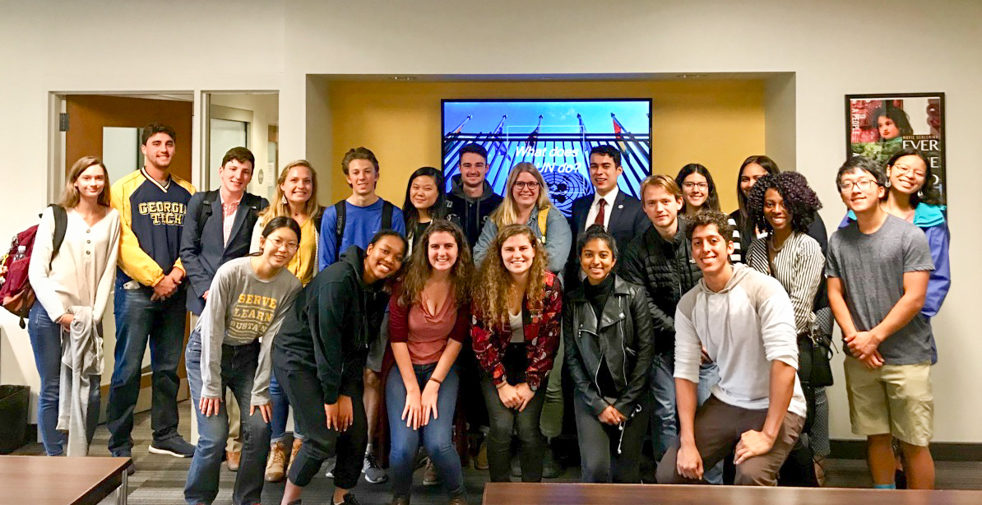This past spring, the Turner Foundation granted $40,000 to Georgia Tech’s Serve-Learn-Sustain program (SLS) in conjunction with the RCE Greater Atlanta youth sustainability network.
The network will be using the grant funding to create online training modules for the United Nations (UN) on globally-recognized sustainable development goals.
“We are very appreciative of the opportunity, since the RCE isn’t a non-profit,” said Isabella Stubbs, 4th-year ENVE and intern with Serve-Learn-Sustain.
“We’re still developing, so we are very thankful to even get to apply for the grant and get to put the money towards such valuable projects like the Unitar education program.”
The RCE, or Regional Center of Wxpertise, is a UN affiliated program that aims to implement sustainability practices into everyday life through educating young adults. The program stems from many Atlanta-based universities, including affiliation at Tech.
Although it used to mainly operate through an email newsletter of resources and local opportunities, the Turner Grant has introduced a chance for RCE members to extend their impact.
With the new source of funding, 14 RCE members have been selected to craft online sustainability modules that explain the UN’s Sustainable Development Goals (SDGs) through local Atlanta cases as well as through research abroad.
The project will create seven 90 minute lessons on topics ranging from infrastructure to climate to social goals like zero poverty and hunger. The fellows interview community partners, corporate partners and international initiatives to gather information relevant to the SDGs. The fellows then add examples of how the RCE and local campuses engage with each SDG.
The research is finally sent to the United Nations affiliated service Unitar. Once the information is received by Unitar, it will be programmed into an online course complete with graphics, videos and even a certificate of completion for viewers.
Cara McClain, a 4th-year ALIS, explained the significance of these videos that she helped to create in terms of outreach.
“Rights that people are granted vary in many ways across the globe and I believe that sustainability education (whether that is through the SDGs or through another platform) is a step closer to ensuring that all people are granted human rights across the world,” McClain said.
Although conducting this research will impact many of the youth in Atlanta, Stubbs shared other ways in which Tech students can help achieve the SDGs. “SDG3 Saturdays” serve as one such way to get involved.
“SDG3 is about good health and wellbeing,” Stubbs said. “So basically just hanging out at Piedmont Park. You can jog if you want, or work out if you want, and then we’ll go to the Green Market.
“We’re just trying to put SDG3 into practice and have some more fun together.”
The network does a lot more than just social activities with like-minded friends. An email update newsletter circulates to RCE Greater Atlanta members and highlights many opportunities from guest speakers, volunteering events, and local tours. Another program matches college age members with a sustainability expert working in a similar industry to their major.
“Since we’re in Atlanta, and we have these different community groups, we want to have more of a grassroots movement,” said Stubbs.
“It’s not just academia; it’s also industry, non-profits, government offices like The Office of Resilience and The Office of Agriculture. There’s a lot happening in Atlanta.”
Stubbs encourages all students interested to join the network, no matter what their experience with sustainability.
When she first started working with the SLS program in 2018, Stubbs was still processing how to even define buzzwords like “sustainability.”
“Sustainability — an unachievable goal,” she offered with a laugh. “There’s lots of official definitions. But think about daily life … I do believe the SDGs can be applied to daily life, when you look at things like quality education. Help tutor someone – that’s contributing to that.”
“These sustainable goals are really hard to achieve. ‘No poverty’. ‘No hunger.’ How will we achieve that globally?” Stubbs asked. “We just have to think small, within ourselves. Even small initiatives on Tech’s campus help contribute to that.”
